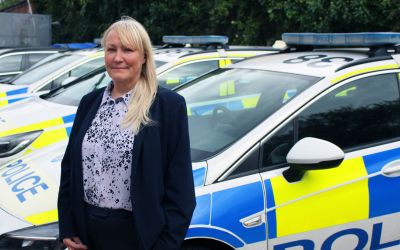Meet Detective Constable Lynda Stearman
 With over 19 years of service, Detective Constable (DC) Lynda Stearman spoke to us recently about her career, being a Family Liaison officer, and why being a Detective is one of the best roles in policing.
With over 19 years of service, Detective Constable (DC) Lynda Stearman spoke to us recently about her career, being a Family Liaison officer, and why being a Detective is one of the best roles in policing.
Age at joining: 38
Length of Service: 19 years
What attracted you to policing? After taking redundancy from British Airways, I wanted to become a paramedic – however after passing the entrance exam I realised it wasn’t for me. I never really aspired to become a Police Officer, but when I realised that my age at the time, my life experience, and my ability to talk to people were beneficial to a policing, I decided this would be the ideal next step.
How did your career in policing progress? I’ve had several roles; from being a Police Officer working on Incident Crime & Response (ICR), to being a STO (Specially Trained Officer looking after complainants of Rape and Serious Sexual Assault), to transferring into the Domestic Abuse Unit where I worked for five years. After doing my CID (Criminal Investigation Department) course I spent five years in Aylesbury CID, and I’m now in CID in Milton Keynes.
What would a typical day look like as a detective? After looking at the night turn DC handover it would be decided what actions each detective would take. This could be conducting interviews, house-to-house and CCTV enquiries, managing a scene watch, or liaising with Crime Scene Investigation (CSI).
Depending on the nature of an incident we would also liaise with outside agencies such as the Fire Service, HSE, specialist search teams, the coroner’s office. etc. Furthermore, it may have been agreed that a suspect needs to be put before the Crown Prosecution Service (CPS) for a charge and remand, so a file needs to be completed.
A detective will need to do some shift work although once qualified they would be expected to do around 3 or 4 nightshift covers over the year.
How can your career develop when you work as a detective? There are several roles to specialise in – Family Liaison Officer (FLO), Visual Recorded Interview (VRI) training so interviews can be completed with vulnerable adults or children, or Advanced Interviewing for both suspects and significant witnesses. You can progress in rank as well.
What does being a Family Liaison Officer (FLO) mean? They will usually be allocated if a person, or persons, have been unlawfully killed and the FLO would be a family’s point of contact with the police. The FLO would keep them updated with the progression of the investigation and answer any questions.
The role is extremely important as this ensures the family can trust that the police investigation is being completed to the highest level, but also ensures that all the questions the investigation team have are answered.
Learn more about the work of a FLO
What makes a great detective? A great detective is someone who can communicate well with people – not just with members of the public but also with colleagues – who has attention to detail and likes to investigate. There is a lot of paperwork within investigations which needs to be completed thoroughly, and good Detectives will often get charges from the CPS as a result. They will then go to Court and hopefully get a conviction, so being able to accurately document information properly is really important.
What would you say to someone considering becoming a detective? I believe being a detective is the best job in the police. Although uniformed officers are so important and are the first people on scene, a detective will build the investigation and will direct colleagues. A detective will go to court, and when a guilty verdict is returned for one of your investigations, it’s the best feeling to relay this to the complainant.
Policing is the best job I’ve had – there is a variety of work, and every day is a school day! There is the knowledge that after a good investigation you have got justice for a complainant or family and possibly changed their lives for the better.
If you want a career that matters, and investigation has always appealed to you, I fully encourage you to apply to become a Detective!
–
Feeling inspired and want to learn more about working as a Detective? If you hold a degree or are in your final year of your study in any field, our Detective DHEP programme could be for you.
Applications are now open, become a Detective with TVP – visit our Detective Constable page today to apply.


 Facebook
Facebook
 Twitter
Twitter
 Linkedin
Linkedin
 Instagram
Instagram